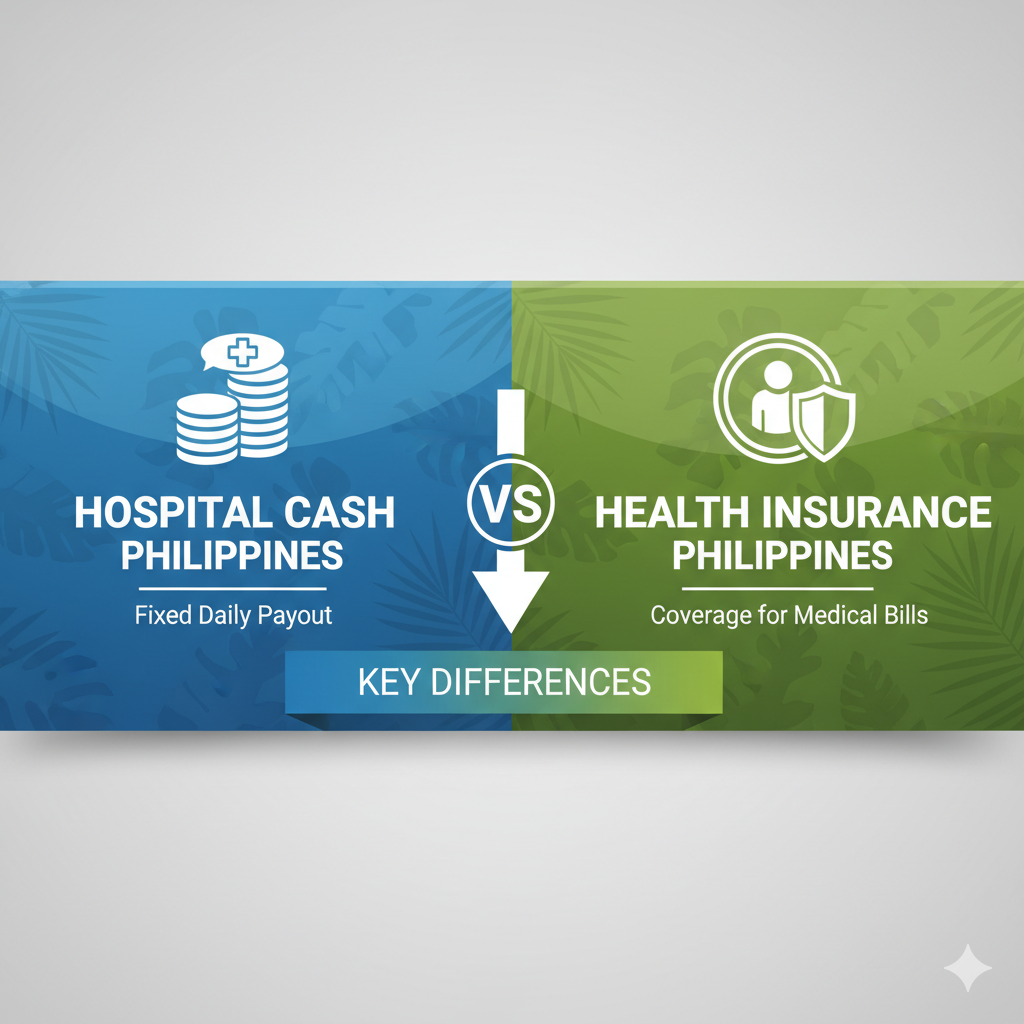Hospital cash vs health insurance in the Philippines — clear, simple differences
If you’re shopping for protection for hospital bills and daily expenses, understanding hospital cash vs health insurance philippines differences will save you money and stress. This guide breaks down the real-world tradeoffs so you can pick the right cover for your budget and risk.
Many Filipinos mix government coverage (PhilHealth), HMOs, private health insurance, and add-ons like daily hospital cash — so learning hospital cash vs health insurance philippines differences helps you spot gaps and smart top-ups.
Read on: this article explains definitions, key differences, costs, when to choose each, sample use cases, and FAQs — all aimed at quick decisions about hospital cash vs health insurance philippines differences.
What is a hospital cash (daily cash) benefit?
A hospital cash plan (also called daily hospital cash) pays a fixed cash amount for every 24-hour period you’re confined in hospital. It’s an indemnity-style benefit: you get the money regardless of the actual billed hospital costs and can use it for room upgrades, food, transport, caregiver expenses, or lost income. This is common as a rider or standalone product in many markets. Policybazaar
What is health insurance (private / PhilHealth / HMO)?
“Health insurance” is an umbrella term covering plans that pay for medical costs — from PhilHealth case-rate reimbursements for inpatient care to private indemnity or expense-covered plans that settle hospital bills, surgeries, diagnostics, and sometimes outpatient care. PhilHealth uses predefined case rates for inpatient benefits while private insurers/HMOs may offer broader limits or direct hospital billing. PhilHealth+1
Key differences at a glance
-
Payment type: Hospital cash = fixed daily cash per day hospitalized. Health insurance = covers expenses (room, procedures, meds) or reimburses actual costs up to limits. Digit Insurance
-
Proof & receipts: Health insurance claims usually need itemized hospital bills and physician reports. Many hospital cash plans pay with simpler proof (admission/discharge documents). Policybazaar
-
Use of money: Hospital cash is flexible — you can spend it on non-medical costs or lost income. Health insurance money is intended for medical bills and provider settlement. Digit Insurance
-
Premiums: Hospital cash riders are generally cheaper than full medical plans; standalone comprehensive health plans cost more but cover high-cost procedures. prulifeuk.com.ph
-
Overlap: Hospital cash does not replace comprehensive health insurance; it complements it by filling small gaps and offsetting incidental costs.
Why Filipinos add hospital cash to their protection
PhilHealth covers many inpatient case rates but may leave room upgrades, non-case items, or co-payments uncovered. Adding a hospital cash rider or a cheap standalone hospicash plan provides immediate liquidity during confinement — useful if you need to cover additional family expenses or lost wages while hospitalized. PhilHealth+1
Which one should you buy? A simple decision checklist
-
If you want low cost and short-term cash during admission → consider hospital cash.
-
If you want comprehensive coverage for surgeries, diagnostics, long hospital stays, or chronic conditions → get health insurance (private/HMO + PhilHealth).
-
If budget allows, combine: base health insurance + hospital cash rider gives the best protection for both major bills and day-to-day hospital costs.
Practical examples (short)
-
Minor surgery, 3-day stay: health insurance pays medical bills; hospital cash covers taxi, companion’s food, and partial lost income.
-
Major operation with long ICU stay: health insurance (and PhilHealth) handle big costs; hospital cash helps with incidental expenses and household cashflow.
How to compare plans (quick checklist)
-
Check coverage limits, sub-limits (ICU, room category), and exclusions.
-
Look at waiting periods for pre-existing conditions and for hospital cash payouts.
-
Confirm claim process: direct billing vs reimbursement.
-
Compare premium increases by age and renewal guarantees.
-
Run numbers: would a daily cash amount × expected days meaningfully offset typical out-of-pocket expenses?
FAQs
Q: Will hospital cash pay if PhilHealth already covered my bill?
A: Yes — hospital cash is independent. It pays the daily amount per policy terms regardless of PhilHealth reimbursements. Policybazaar
Q: Can I use hospital cash for outpatient surgery?
A: Many hospicash plans require a minimum 24-hour confinement, but some modern products pay for specified day-procedures — check the policy wording. Digit Insurance
Q: Do HMOs include hospital cash?
A: HMOs focus on direct medical services and provider networks; some HMOs or insurers offer daily cash riders as add-ons. Always read the product brochure. inlife.com.ph
Quick buying tips (Filipino context)
-
Always keep PhilHealth active — it reduces your case-rate exposure. PhilHealth
-
For younger, healthy buyers: a low-cost health plan + hospital cash rider gives broad protection without breaking the bank. prulifeuk.com.ph
-
If you’re an OFW or frequently travel, compare portability and overseas coverage options.
Conclusion (one paragraph — keyword used 3 times naturally)
To recap clearly: when evaluating protection options, remember that hospital cash vs health insurance philippines differences are mainly about how money is paid (fixed daily cash vs expense coverage), what you can use the money for, and how much you’ll pay in premium. Thinking through hospital cash vs health insurance philippines differences helps you design a plan that covers both big hospital bills and everyday confinement costs. If you want practical protection without big premiums, combining a basic health plan with a hospital cash rider is often the best compromise to handle both the financial shock and the small daily expenses — which is why the hospital cash vs health insurance philippines differences decision matters.


